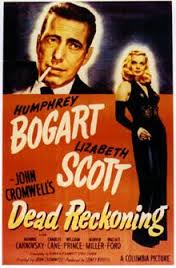
DEAD RECKONING
US, 1947, 100 minutes, Black and white.
Humphrey Bogart, Lizabeth Scott, Morris Carnovsky, Charles Cane, William Prince, Marvin Miller, Wallace Ford, James Best.
Directed by John Cromwell.
Dead Reckoning is an entertaining Humphrey Bogart vehicle. With its post-World War Two setting, it fits into the pattern of film noir that was so popular at that period: so many of the films with Dick Powell (Cornered, To the Ends of the Earth), Gilda, Out of the Past. Lizabeth Scott, early in her career, proves to be an effective femme fatale (in the Lauren Bacall vein). The film has the atmosphere of gangsters, easy money, betrayals. Direction is by John Cromwell, veteran director of a range of films from the 1937 Prisoner of Zenda to Abe Lincoln in Illinois, The Enchanted Cottage, The Goddess?
1. Interesting and entertaining? Film noir and the '40s?
2. Columbia and film noir: black and white photography, a look at America, light and darkness, good and evil? The atmospheric score?
3. The title, thriller, film noir? Audience response to themes, the ambiguities of values in the characters?
4. The structure of the film: the focus on Rip Murdoch, his going into the church, the priest? The voice-over technique? The comment, analysis, critique of what happened?
5. The situation, the war, Preston calling himself Drake, his heroism, the mission, the medal, being summoned to Washington? Caution, running away? His letter to Rip? The melodrama of his car accident death? The film as a puzzle? Whodunnit?
6. Humphrey Bogart as Rip? Friendship with Drake, knowing Corall Dusty from him? His pursuit of his friend, the commission from the army, going south, the hotel, the nightclub? Encountering Coral and hearing her song? Martinelli and his henchmen? Louie and his wanting to give him the letter? Rip as the loner, listening to the radio, hearing the police, going to the morgue to identify the body? Coral and forcing the truth from her? The gambling and the repayment? Coral's stories, wealth? Martinelli and drink? Knocking Rip out? Louie's death? The contact with Mc See and the safe-cracking? Coral and the drive, stopped by the police, the proposal of marriage? His disbelief about Coral? Her ringing the police? Caught by Martinelli, the smell of jasmine? Going to the priest? Coral's penthouse and the confrontation? Truth and the firing of the shot, Coral thinking she had killed him? The crash? Her death? Humphrey Bogart as the 1940s American screen hero, laconic with the touch of humour, a man of integrity?
7. The dramatic situation in the town: Johnny and Coral, professor, the murder and the blame? Coral's life? Martinelli and his hold? Crime and gamblers? Mystery? Coral and her gambling? Confronting Rip? The end and her firing, death?
8. Coral: Lizabeth Scott and her deep-throated blonde style, the photo, the song, grief? Gambling, the penthouse and the maid? In love, the speeding? Ringing the police to prove herself? The irony of the jasmine scent? Her double-dealing and lies, the truth, crash and death? The irony of 1Geronimo' as the password for the parachutists? Its ironic use?
9. The police, Rip tricking them, the investigations, his ways of eluding them? The morgue, the restaurant, the end?
10. Martinelli as villain? The world of mobsters? Power, control over women? The henchmen? Waiters? Safe-crackers?
11. The film's comment on post-war America, heroism and realism?